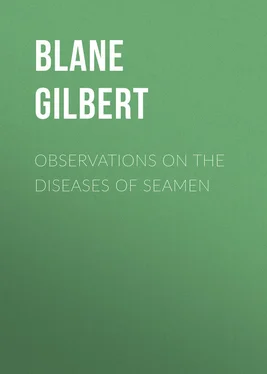Gilbert Blane - Observations on the Diseases of Seamen
Здесь есть возможность читать онлайн «Gilbert Blane - Observations on the Diseases of Seamen» — ознакомительный отрывок электронной книги совершенно бесплатно, а после прочтения отрывка купить полную версию. В некоторых случаях можно слушать аудио, скачать через торрент в формате fb2 и присутствует краткое содержание. Жанр: foreign_antique, foreign_prose, на английском языке. Описание произведения, (предисловие) а так же отзывы посетителей доступны на портале библиотеки ЛибКат.
- Название:Observations on the Diseases of Seamen
- Автор:
- Жанр:
- Год:неизвестен
- ISBN:нет данных
- Рейтинг книги:3 / 5. Голосов: 1
-
Избранное:Добавить в избранное
- Отзывы:
-
Ваша оценка:
- 60
- 1
- 2
- 3
- 4
- 5
Observations on the Diseases of Seamen: краткое содержание, описание и аннотация
Предлагаем к чтению аннотацию, описание, краткое содержание или предисловие (зависит от того, что написал сам автор книги «Observations on the Diseases of Seamen»). Если вы не нашли необходимую информацию о книге — напишите в комментариях, мы постараемся отыскать её.
Observations on the Diseases of Seamen — читать онлайн ознакомительный отрывок
Ниже представлен текст книги, разбитый по страницам. Система сохранения места последней прочитанной страницы, позволяет с удобством читать онлайн бесплатно книгу «Observations on the Diseases of Seamen», без необходимости каждый раз заново искать на чём Вы остановились. Поставьте закладку, и сможете в любой момент перейти на страницу, на которой закончили чтение.
Интервал:
Закладка:
The only ship in which there was any thing like an epidemic was the Canada, This ship, when at home, had for many months before she sailed been in unremitting service, and very little in port. On the passage from England to America, in August, 1781, there broke out a severe dysentery, to which the scorbutic habit of the men, from being so long at sea, probably predisposed them. Though it had abated much in February, 1782, it was then by no means extinct, and continued till April. The Prince George had been in commission all the war, and was a model of discipline and cleanliness, and consequently of health. This continued till the passage from America, when, upon the first cold weather after leaving New York, there broke out a violent dysentery, of which sixteen men died. This is agreeable to what Dr. Lind observes, that the flux may be brought on by a sudden transition, either from cold to heat, or from heat to cold. All the men that were ill of this disease having been sent to the hospital at Barbadoes, and the usual attention to cleanliness having been kept up, the disease entirely vanished.
All the other ships of the American station had been more or less visited with sickness after they left England, except the Bedford. This was probably owing to this ship having been longer in commission than any of the others, that is, for four years, and all that time under the same commander. This last circumstance falls to the lot of few ships; but a great advantage attends it; for the mutual knowledge and attachment of the captain and ship’s company is naturally productive of regularity and good discipline, and thereby of health.
The Royal Oak, Prudent, and America, which left England with the Bedford, though they had been afflicted with the scurvy and other complaints soon after arriving in America, had been quite healthy for some time before coming to the West Indies, and were so much so at this period, that, though there were a few sores and slight complaints on their sick lists, there was not a man confined with illness, so as properly to be called sick. The Royal Oak, having been the flag ship of Admiral Arbuthnot, was manned with choice seamen, which is a circumstance generally conducive to health; for these being accustomed to a sea life, are more provident, more handy and methodical in all that relates to diet, cloathing, and cleanliness. The scurvy, which infected her upon first arriving in America, was successfully treated on board by serving to those who were ill of it a mess, composed of soft bread, baked on purpose, and mixed with wine and essence of malt.
The Prudent, though now quite healthy, had been sickly soon after being put into commission in Europe, and upon first arriving in America. She had been uncommonly sickly, when a new ship, upon her first voyage, which was to the East Indies, during the peace. This remarkable degree of sickness was probably owing to a particular experiment that was made in preparing the wood of which she was built. This experiment consisted in soaking the timber for a length of time in a strong pickle, in order to make it less corruptible. The only other ship on which the trial of this was made was the Intrepid; and it has been already mentioned that this was an extremely sickly ship. The effect of it upon the wood was to cause a constant moisture and mouldiness in the orlops and holds. In the Intrepid, the sickness was never conquered till a practice was followed of pumping and bailing her with great care, and putting a fire into the well for six hours every day, by which means the dampness, and the mildew produced by it, were removed and prevented, and the ship thereby rendered healthy.
The two squadrons being united, and consisting of thirty-four ships of the line, proceeded to St. Lucia, where they arrived on the 1st of March.
I received monthly returns as formerly, and the form of them was improved by adding a column for the numbers taken ill of the several diseases in the course of the month. The returns of February are not complete, there being none for the 1st of that month, as we had not then arrived; but as the returns of the 1st of March have relation to the preceding month, a judgement may be formed of the sickness and mortality of February from the following table:
Extract from the Returns of the 1st of March, 1782.

This account is abstracted from the returns of twenty-nine ships of the line, and two frigates.
The diseases and deaths under the head of “Other Complaints,” is much more numerous in this month than usual, which is chiefly owing to the preceding actions with the enemy, and to the prevalence of the small pox. Of the deaths under this head, seventeen were in consequence of wounds, six from small pox, one from a mortification 10in the shoulder, and one from consumption.
None of the epidemics affected one part of the squadron more than another, except that the ships last from England had a less proportion of the flux than the rest; and the few cases of this disease that were in these ships arose after their arrival in the climate. The Conqueror and Fame, which were the two most sickly ships, had no complaints but fevers.
The fevers had now begun to take on some of the characteristic symptoms of the climate; the chief of which is a greater abundance of bile. In the Repulse, two men had the yellow colour of the skin, which is so peculiar to the fevers of this climate.
The crew of the Anson caught an infectious fever from a guardship in England; and when the Prothée sailed, there was a fever of the same kind on board; but from the change of climate, the symptoms became milder, and the disease disappeared in both these ships in the course of this month.
The small pox prevailed more at this time in the fleet than I have ever known it to do either before or since, and that both in the squadron from England and in that from North America. There were six cases in the Formidable, all of which did well, though two were of the confluent kind.
Though there needs hardly any additional proof of the extraordinary efficacy of lemon juice in curing the scurvy, yet it may be of service to impress so useful a truth on the mind by mentioning such striking proofs of it as occurred from time to time. The Arrogant spoke with a Portuguese vessel near Madeira, from which some of this fruit was procured, and the only scorbutic man on board happening to have some of the most desperate symptoms, such as putrid gums, contracted hams, the calves of the leg hard and livid, and frequent faintings, a fair opportunity offered for trying its virtues. The man was allowed two of them daily, and was perfectly well in sixteen days, during all which time the ship was at sea, so that it was impossible to ascribe the cure to any other cause.
The fleet remained at St. Lucia from the 1st till the 18th of March, completing the water, provisions and stores, landing the sick at the hospital, and also watching the motions of the enemy, who arrived about the same time at Martinico from the siege of St. Christopher’s. During this time we were reinforced with the Duke, of 90 guns, and the Warrior and Valiant, of 74 guns, from England. On the 18th the whole fleet, except the Invincible, which was detached with a convoy to Jamaica, sailed on a cruise to windward of Martinico, in quest of a French convoy expected from Europe; which having eluded us, and got into their own harbour, the whole fleet returned to St. Lucia on the 30th of March, excepting the Prudent, which was sent to Barbadoes.
We found at St. Lucia the Magnificent, of 74, and the Agamemnon, of 64 guns, which were the last reinforcement of this campaign, making the British fleet on this station amount to forty ships of the line, a much greater force than was ever before employed on foreign service. They were all copper bottomed.
Читать дальшеИнтервал:
Закладка:
Похожие книги на «Observations on the Diseases of Seamen»
Представляем Вашему вниманию похожие книги на «Observations on the Diseases of Seamen» списком для выбора. Мы отобрали схожую по названию и смыслу литературу в надежде предоставить читателям больше вариантов отыскать новые, интересные, ещё непрочитанные произведения.
Обсуждение, отзывы о книге «Observations on the Diseases of Seamen» и просто собственные мнения читателей. Оставьте ваши комментарии, напишите, что Вы думаете о произведении, его смысле или главных героях. Укажите что конкретно понравилось, а что нет, и почему Вы так считаете.












